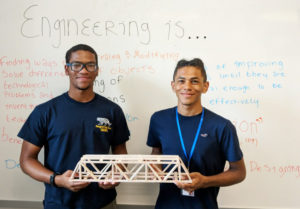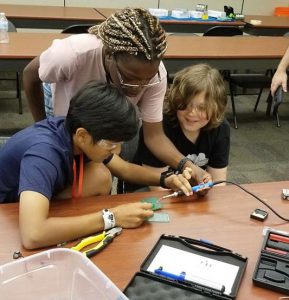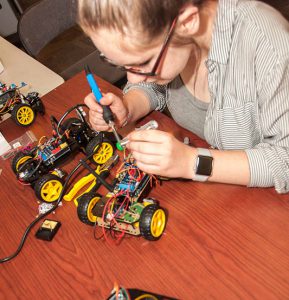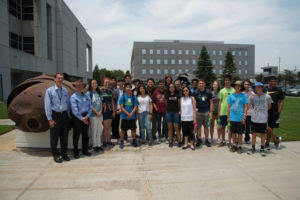What Is Electrical Engineering?
Electrical engineering is the field of engineering, concerned with the study, designing, and use of appliances and equipment which use any form of electricity. Therefore, it also includes electromagnetism. Electrical engineering was first acknowledged as a profession when commercialization started to gain ground in the 19th century when electricity became widely generated and distributed. However, this branch of engineering spreads over a wide range of subtypes that include telecommunication, computer engineering, electronics, photonics, etc. Although, instrumentation and signal processing, all are considered part of electrical engineering.
Previously, electrical engineering was limited to industrial use only. However, after the invention of the transistor, the manufacturing cost led the electrical revolution to become part of electric home appliances. Therefore, minimizing the cost of electrical appliances. Even so, they could easily become part of almost every household.

What are the Branches of Electrical Engineering?
- Power Engineering
Power engineering, which is also referred to as power system engineering, studies the generation, transmission, and distribution of electric power. This field of engineering revolves around transformers, motors, and generators. Power engineers work responsibly to provide seamless operating procedures ensuring safety and avoiding any power disruptions.
- Control Engineering
Also known as Automation Engineering in most parts of Europe, control engineering deals with control systems. This field focuses on the designing of the equipment to fixing and controlling the required results, control engineering encompasses all of this. The basic discipline of this form of engineering is the application of control theory to make systems behave a certain way.
- Electronic engineering
Electronic engineering is a highly demanding field all around the globe. It is a form of engineering that deals with electronic circuits, devices, and electronic supplies. It is positively applicable in the systems where those circuits and devices are planted and assembled.
- Microelectronics
Microelectronics is a sub-type of electronic engineering and a fast-paced field every passing year. As the name implies, it deals with the manufacturing and development of miniature components of electrical designs, primarily semiconductors. In most cases, these gadgets are made on the micrometer scale and are formed from semiconductor materials.
- Signal Processing
Signal processing harnesses its attention on integrating, manipulating, and generating signals that may be sound, images, or scientific measurements. Signal processing is fundamentally used to enhance transmission, efficiency for storage, and the associated quality. It deals with the receiving of a signal and translating them into understandable syntax.
What jobs do Electrical Engineers do?

They are the architects and developers of all sorts of electrical systems. Usually, their job is to develop and verify electrical systems, circuits, devices, and individual components using their knowledge and experiences. They also work with the automation of various production processes.
To put it in the easiest of words, an electrical engineer is he who designs, tests, and manages the development of any form of electrical equipment from a mobile phone to an electric motor. Electrical engineering is a vast field and is rich enough to offer various opportunities, including the development of automated electric cars and smartphones. Hence, electrical engineers are worthwhile assets to many industries.
Usually, electrical engineers work in indoor offices as most of their work requires research and development. However, they also make visits to the worksite to check up on electrical equipment that may require maintenance or improvement.
What Skills do an Electrical Engineer need?
An electrical engineer needs a certain set of skills to be distinguished at their job! Positively, they should be able to have the ability to scrutinize situations from a critical point of view, have the essential technological knowledge required for this field, to have impeccable debugging, improvisation, and visionary thought processes. However, Mathematical and physical backgrounds are also vital to prove oneself a dynamic electrical engineer. They should also have strong organizational and managerial instincts.
What Careers are there in Electrical Engineering?
- Control Engineer
A control engineer designs and develops systems and equipment that help in creating products. Control engineers test their designs, inquire about detected errors and find suitable solutions to correct them!
- Project Engineer
Electrical engineering projects require a supervisor to oversee the entire management of things. They are required to stick to a budget, hire a task force, and accomplish a goal within a timeline. Project engineers are required to keep a close eye on each member’s work and ensure that everyone works as a team to make the project a success!
- Test Engineer
A test engineer performs tests on electrical systems and offers expertise in managing them. They are involved in the test planning, analysis of the results, and research for the perfect solution.
- Design Engineer
With computer-based designing software, design engineers form systems and products. They create designs that are according to particular specifications. Experimentation can be performed, followed by the track of their progress. Design engineers often have to make modifications to systems, so those specific requirements are achieved.
- Communications Engineer
A communications engineer builds communication systems such as satellites and fiber optics. They may also play a role in the installation of such devices to ensure quality results.
How much do Electrical Engineers earn?
The average salary in the United States for someone who is just starting a career as an electrical engineer is $74,423 annually. It may rise to $116,764 per year if promoted to the post of a senior electrical engineer.
How to become an Electrical Engineer?
To become an electrical engineer, one must complete high school 4-years followed by a bachelor's degree in electrical engineering. To attain some on-field experience in the actual professional environment, a year or two preferably be spent as a junior engineer. However, it is highly suggested that freshie engineers must enroll in a Master’s program, which would further take from a year to three! If you have a teen who is interested in engineering make sure you check out summer engineering camp where teens can learn hands on experience with the industry. During the electrical engineering module teens will learn work on projects specific to electrical engineering and get to meet with real life engineers working in the field.

Becoming an electrical engineer is no ordinary feat. The persistence, innovation, and patience required for the job are demanding but so is the reward, once you gain hands-on experience and reach the required level of expertise.
Electrical Engineering Links and Resources
- International Society for Optics and Photonics: an international society advancing an interdisciplinary approach to the science and application of light.
- Association for Computing Machinery: the world’s largest educational and scientific computing society focused on advancing computing as a science and a profession.
- Audio Engineering Society: the only professional society devoted exclusively to audio technology.
- Electric Power Research Institute: a nonprofit professional organization focused on addressing challenges in electricity.
- IEEE: the world’s largest professional association for the advancement of technology.
At the TryEngineering Summer Institute summer engineering programs for high school students, you’ll explore various engineering fields, such as electrical, civil, mechanical, and aerospace. Our STEM summer course allows you to meet working engineers and experience VIP tours of engineering companies and centers. Learn new skills and engage in hands-on projects that explore how engineers can solve real-world problems.
The TryEngineering Summer Institute is a program from IEEE, the world’s largest professional association for the advancement of technology. Our more than 417,000 members in 160 countries, including more than 120,000 student members, help us provide the trusted "voice" for engineering, computing and technology information around the globe via highly-cited publications, conferences, technology standards and professional and educational activities. Our curriculum is created specifically for this program by IEEE STEM summer specialists.
Last summer we visited:
- NASA's Johnson Space Center (Rice University students)
"If you are ever thinking about doing engineering or trying to see what it's like, I would 100% recommend this camp." - 2023 student

Click above to watch our video: All About the TryEngineering Summer Institute
Our Engineering Program
TryEngineering Summer Institute gives teens the opportunity to explore a variety of engineering disciplines in a fun, hands-on way. The program is ideal for students who are considering a degree or career in engineering, as well as for those that are curious to learn more. Whether your teen is brand new to engineering, or has taken a few classes in school, every student will have fun tackling a variety of engineering design challenges while developing skills in engineering, communication, and consensus-building. The program is designed by IEEE STEM summer specialists specifically for our TryEngineering Summer Institute.
Students participate in team-based, hands-on design challenges, hear from and interact with working engineers, and experience exciting off-campus field trips to local engineering sites.
The program is perfect for those who want to:
- Find out how engineering is applied in the real world, and how it’s shaping our future.
- Participate in multi-disciplinary projects in electrical, civil, mechanical, aerospace and other engineering disciplines.
- Learn to think like engineers while building critical thinking, communication and collaboration skills.
- Experience how engineers work in teams to solve local and global challenges.
- Gain insight into what it’s like to study engineering at the university level.
- Engage with professionals working in your field of interest.
- See real-world engineering projects while learning about future academic and career possibilities through exciting trips and tours.
- Build awesome projects that teach engineering concepts by making things like rockets, remote control cars, drones, trebuchets, building and soldering circuits, and much more.
…All while having fun with new friends on one of our engineering campuses.
Curriculum Overview


Questions about our programs?
Call us at +1 315-816-4023 or email info@tryengineeringinstitute.org
Program Highlights

Hands-On Design Challenges

Exclusive Guest Speakers

Exciting VIP Tours
and Field Trips

Access University Engineering Labs and Tech Spaces
Scholarships
A limited number of scholarships are available for those that demonstrate financial need. Click the link below to learn how to apply.
Locations
Philadelphia, PA
Session 1: July 14, 2024 - July 22, 2024
Session 2: July 25, 2024 - August 2, 2024
Houston, Texas
Session 1: June 30, 2024 - July 8, 2024
Session 2: July 11, 2024 - July 19, 2024
San Diego, California
Session 1: June 30, 2024 - July 8, 2024
Session 2: July 11, 2024 - July 19, 2024






 With nonstop sunshine and the beaches, strands, shopping and more just a stone’s throw from campus, our USD TESI students will really have a wonderful summer. With such beautiful surroundings, we get the chance to explore and maybe even find the legendary fish taco truck!
With nonstop sunshine and the beaches, strands, shopping and more just a stone’s throw from campus, our USD TESI students will really have a wonderful summer. With such beautiful surroundings, we get the chance to explore and maybe even find the legendary fish taco truck! The University of Pennsylvania is a fabulous, safe urban campus located in the heart of Philadelphia. This allows us easy access to many of the local sights, sounds and flavors available to us!
The University of Pennsylvania is a fabulous, safe urban campus located in the heart of Philadelphia. This allows us easy access to many of the local sights, sounds and flavors available to us! The entrance is staffed by Penn Security 24/7. Inside is our air-conditioned wonderland, packed with the same fabulous amenities the Penn students enjoy. We also have our own outdoor area, inside the secure walls, where we have patio seating, tables, a grassy area, and more. It is quite lovely.
The entrance is staffed by Penn Security 24/7. Inside is our air-conditioned wonderland, packed with the same fabulous amenities the Penn students enjoy. We also have our own outdoor area, inside the secure walls, where we have patio seating, tables, a grassy area, and more. It is quite lovely.




 Past students have had the opportunity to discover on-campus engineering tools, equipment and technology that will be available to them as future engineering students. In previous summers we have toured the engineering departments at our host venues to meet and greet and see what are the latest aspects and cutting edge work that is being done.
Past students have had the opportunity to discover on-campus engineering tools, equipment and technology that will be available to them as future engineering students. In previous summers we have toured the engineering departments at our host venues to meet and greet and see what are the latest aspects and cutting edge work that is being done. Get a peek at the inner workings of top engineering companies and centers and discover the world inside your dream career! In previous years, our students:
Get a peek at the inner workings of top engineering companies and centers and discover the world inside your dream career! In previous years, our students: Students will gain valuable knowledge from engineering professionals on how to succeed in college and in an engineering career.
Students will gain valuable knowledge from engineering professionals on how to succeed in college and in an engineering career. TryEngineering Summer Institute students explore engineering design challenges through hands-on teamwork. Previous students participated in projects such as:
TryEngineering Summer Institute students explore engineering design challenges through hands-on teamwork. Previous students participated in projects such as:













